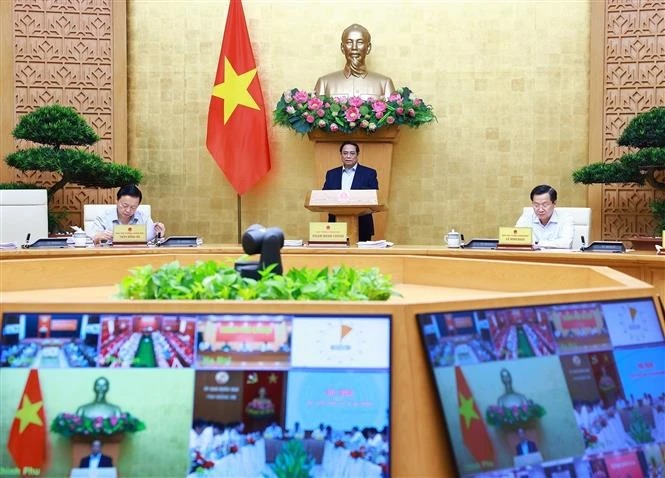PM orders 6.5 - 7% growth be secured for Q3
Prime Minister Pham Minh Chinh on July 6 ordered efforts be made to achieve an economic growth rate of 6.5 - 7% in the third quarter to secure the best possible results for the entire 2024.

Prime Minister Pham Minh Chinh on July 6 ordered efforts be made to achieve an economic growth rate of 6.5 - 7% in the third quarter to secure the best possible results for the entire 2024.
He made the request while chairing the Government’s regular meeting for June and teleconference with the 63 provinces and centrally-run cities nationwide.
The Government leader said that socio-economic activities recovered more positively during the first half of 2024, with performance getting better month over month and quarter over quarter.
The economy has bounced back to the pre-pandemic level, he stated.
The gross domestic product (GDP) grew 6.93% in Q2 and 6.42% in H1, which is high compared to other countries’ in the region and the world and also surpasses the 5.5 - 6% scenario set in the Government’s Resolution 01.
The macro-economy has been kept stable, inflation under control, and major balances guaranteed. At the same time, social security and the quality of people’s life have been improved, political security and social order and safety basically ensured, external relations enhanced, and the national prestige and stature further promoted, PM Chinh said.
Many international organisations and experts continued to highly value the results and prospects of the Vietnamese economy. The Asian Development Bank (ADB), Standard Chartered, and HSBC predicted this year’s GDP growth at about 6% while the International Monetary Fund (IMF) held that Vietnam will be the only Southeast Asian representative in the top 10, with a growth rate of 6.4% forecast for 2024 - 2029.
Emphasising the targets of a growth rate of 6.5 - 7% and inflation of under 4.5% for Q3, he asked ministries, sectors, and localities to comprehensively, strongly, and effectively carried out the tasks and solutions identified by the Party Central Committee, Politburo, key leaders, National Assembly, and Government.
They must continue to prioritise promoting growth in tandem with firmly maintaining macro-economic stability, controlling inflation, and ensuring major economic balances, he said, demanding a reasonably expanded and focus-driven fiscal policy that is coordinated harmoniously with and facilitates the implementation of a proactive, flexible, timely, and efficient monetary policy.
Foreign exchange rates and interest rates should be set at reasonable levels. In particular, lending interest rates should be reduced to aid production and business activities, sufficient credit supply guaranteed, credit access boosted, and the foreign currency and gold markets kept stable. Additionally, it is important to tighten financial and budgetary discipline; enhance the budget collection management; cut state budget expenditure; exempt, reduce, and extend the payment deadlines of taxes, fees, charges, and land use fees; and remove obstacles to facilitate the real estate, corporate bond, and stock markets, according to the Cabinet chief.
PM Chinh asked ministries, sectors, and localities to further speed up public investment disbursement, the three national target programmes, and key infrastructure projects.
Besides, they need to renew the traditional growth drivers, he went on, elaborating that in terms of investment, they have to bolster public investment projects, encourage private investment, strengthen public - private partnership, and selectively attract foreign direct investment (FDI). Regarding export, it is necessary to consolidate traditional markets, explore new ones, and help businesses to meet new and green standards. Meanwhile, domestic consumption, together with e-commerce and cashless payment, should be strongly stimulated.
He also underlined the need to strongly fuel new growth drivers, especially in the fields of mechanisms and policies; regional economy and connectivity, and urban development; along with digital transformation, green transition, circular economy, sharing economy, knowledge-based economy, as well as the areas with high added values like semiconductor and artificial intelligence.
In his remarks, the PM requested due attention be paid to cultural, social, and environmental affairs to ensure social security and improve people’s life quality. He also ordered further strengthening defence - security, safeguarding social order and safety, and augmenting the fight against corruption and negative phenomena.
Ministries, sectors, and localities were also told to properly prepare for external activities of high-ranking leaders, boost the fruitful implementation of international agreements, and press on with making the three strategic breakthroughs in terms of institution, infrastructure, and human resources.

